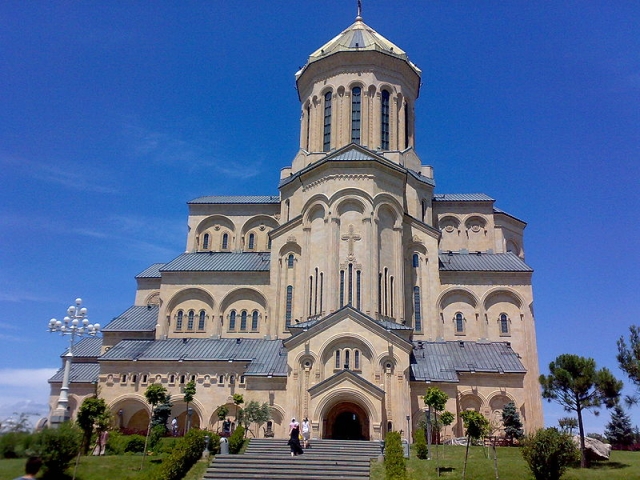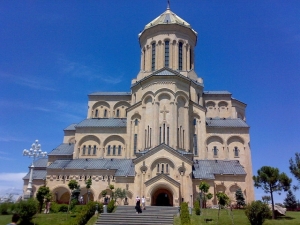Who to Orbit?
OP-ED
The two-day visit is over. The leaders of the Ecumenical Patriarchate visited Georgia in support of the autocephaly of Ukraine, but, alas, they returned to Istanbul without results. The Georgian Church states that the visit was unable to influence their position and seems still reluctant to share its decision as to whether to recognize the autocephaly of Ukraine or not. Now it is time for the Russian Church to visit Georgia and try to convince its Church leaders not to support Ukraine. The meeting should be held in a few days.
The results of the visit from the delegation of the Ecumenical Patriarchate were predictable, with, a few days prior, both secular and clerical authorities openly stating anti-Ukrainian positions. Bishops Iakob, Shio and Spiridon said that it wasn’t wise to spoil relations with Russia, and, in order to support his argument, Bishop Spiridon brought the example of Patriarch Filaret who was refused baptism. MPs Zviad Dzidziguri, Gia Volsky and Zaza Papuashvili were more radical in their public statements, claiming it was “not worth” angering Russia by recognizing the autocephaly of Ukraine. MP Irma Inashvili wrote an open letter in the name of her political party to Patriarch Ilia II in which she stressed the “criminal” actions of the World Ecumenical Patriarchate and its supporters: “These church leaders forget that the Church is not an NGO, and the divided opinions within should not become public beyond its borders.” In her letter, she called on Ilia II to recognize Patriarch Kirill and the Patriarchate of Moscow as leading rather than the Ecumenical Patriarchate of Constantinople and Bartholomew I. Unlike the Alliance of Patriots and other governmental parties, the political opposition fully supports Ukraine, with the exception of Mikheil Saakashvili, who has decided to remain uncharacteristically silent for the moment and has yet to share his position publicly on this epic event.
When it became known that the delegation from the Ecumenical Patriarchate was visiting Georgia, the Georgian Orthodox Church released the following statement: “The granting of the tomos to the Church of Ukraine has given rise to disputes throughout the Orthodox world, both in secular and ecclesiastical circles. Two opposing sides have surfaced in our country, and each is trying by all means to defend the position they consider just. There have been political and religious assessments, and statements made by religious and secular personalities. Neither side abstains from offensive and contemptuous expressions, as well as blackmail, thus casting a shadow on all. We need to know that the responsibility of each of us is great, and that hasty and reckless actions will not lead to any good. At this time, the most important thing is to preserve the unity of the Church, to make sure the tension is reduced, and to create a peaceful environment based on justice. Our efforts should be directed to this unity with prayer and work. We therefore call on all of you to be respectful in your relationships with one another.”
The leader of the visiting delegation, Metropolitan Emanuel of France, told the media that the aim of the visit was to inform the Georgian Patriarchate about the decision and details of the granting of autocephaly to Ukraine, rather than “imposing a certain idea or pressure.” He also added: “We know that the Catholicos-Patriarch of Georgia Ilia II has wisdom and will make a wise decision.” The French Metropolitan stressed repeatedly that, “Now is the time to maintain unity within the Orthodox churches.” He also maintained that the visit was not due to any disagreements between the Ecumenical Patriarchate and the Georgian Church. “We are not here because of any problems in our relationship with the Georgian Church. We have a common position, common views, and this is just an ordinary friendly meeting between brotherly churches.”
What we must do now is wait for the visit of the Russian Church leaders, whose comments will shed clearer light on the position of the Georgian Church, which plans to discuss the issue of recognizing Ukraine’s autocephaly during the Holy Synod this spring. This will also mean deciding who to orbit: Moscow or Constantinople?
by Zaza Jgarkava
Image source: BRUTE












